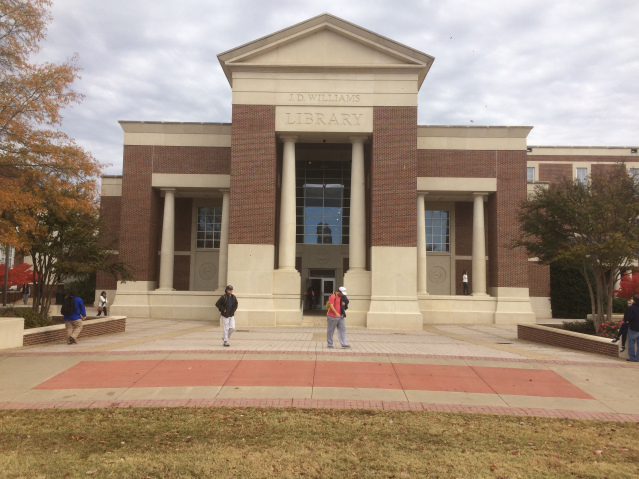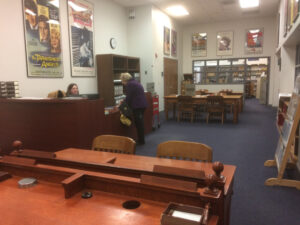Headlines
Donated Books to UM Libraries Appreciated But Don’t Always Make the Shelves
By Alyssa Schnugg
News editor
alyssa.schnugg@hottytoddy.com

The J.D. Williams Library is a vital asset to students and faculty alike at the University of Mississippi. Photo by Jack Hall.
Ginny Guess Cheek, the daughter of Dr. Wallace L. Guess who served as the fourth dean of the University of Mississippi School of Pharmacy for more than 18 years, visited Oxford recently to see old friends.
Missing her father, she remembered he had donated many of his old medical and pharmacy books to the J.D. Williams Library and The Science Library before he left the university. She went to the library to see if she could find the books.
However, the books were no longer there.
“I found out this weekend they throw away old books that no one wants,” she told Hottytoddy.com. “No one bothered to even contact me to see if I would want them. Some were my great-grandfather’s medical books.”
Dean of Libraries Cecilia Botero said that while the donation of books is always appreciated, there is only so much space to house books. At times, the library must clear out old, outdated books to make room for newer books, particularly those needed for research.
“Once we receive books as a donation, we don’t track who that person is anymore,” she said. “They are just integrated into the collection like any other item. They become a part of our overall collection and we take care of them like we do all our books, if we keep them.”

The Department of Archives and Special Collections is located on the second floor of the J.D. Williams Library. Photo by Jack Hall.
Many books are just dropped off at the library in the dropbox with no names attached. Donors can elect to fill out a donation form listing the titles of the books they are donating. However, that is more for the donor’s own information, according to Jocelyn Tipton, assistant dean for Public Services.
“They can use that information for their taxes,” Tipton said. “But we do not offer appraisals on the worth of the books.”
Scholarly materials, including books, might be appropriate gifts for the general collection if they support the University’s unique teaching and research needs. All gifts will be evaluated by their relevance of content to curricula and/or research programs, support of overall collection development priorities, and physical condition.
On occasion, a rare book is found among collections and those may be added to the library’s special collections. All books donated are reviewed to determine if they meet the library’s criteria for adding books to its shelves.
“We have liaisons, librarians who work with different department disciplines, who review those titles to decide if it falls within the scope of what we collect in the subject areas,” Tipton said. “People need to understand they are giving up ownership to us.”
According to library’s website, books gifted to the library are “accepted subject to the policies of the University of Mississippi and with the understanding that the University, upon receipt of said gift, becomes the owner of the donated material and reserves the right to determine retention, location, cataloging treatment, and other considerations relating to its use or disposition.”

Students study alone and in groups in the J.D. Williams Library. Photo by Jack Hall.
There is no guarantee that any book donated to the library will make it to the shelf, Botero said. And it’s unlikely that all books will remain on the shelves for eternity. The library is not a museum, she said, but a working collection.
However, if a book is determined to have historical value it could be added to the Department of Archives & Special Collections that houses archival papers, photographs, films, and sound recordings related to Mississippi, the Blues, the University of Mississippi and the American South.”
The libraries discourage donations of outdated textbooks, offprints, current newspapers, magazines or loose issues of journals, audiovisual materials, homemade copies in any format and materials in poor condition or heavily underlined are generally not accepted.
“We do add many things to our collection through gifts, so it’s not that we don’t appreciate them. I wish people could understand that once we take them in, they become a part of the collection and treat them like all the other books,” Botero said. “So we’re going to weed what needs to be weeded. We’re going to keep it when it needs to be kept. They might be put in different places. There’s no way to give special treatment to one particular book.”
The libraries can take in several hundred books a year on average, some years 200, some years 500-plus.
“One time we had to rent a truck to collect books from a home,” Botero said. “People retire and move or they downsize and they don’t want to just throw the books away.”
Botero said while it might be difficult for people to toss books in the trash for sentimental reason, having to throw away and recycle books is not an easy task for libraries.
“If you want to recycle them, you have to cut the covers off the hardcover books,” she said. “The covers can’t be recycled. Sometimes that’s thousands of books.”
For more information on donating books, visit https://libraries.olemiss.edu/policy-material-donation/.

















You must be logged in to post a comment Login